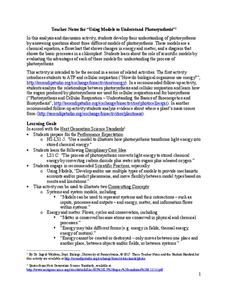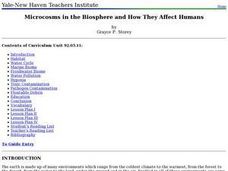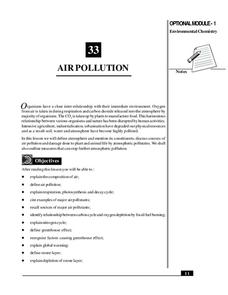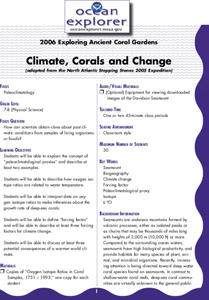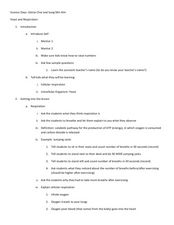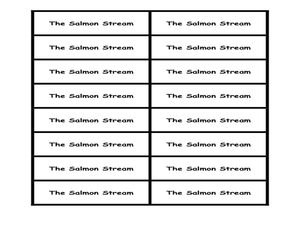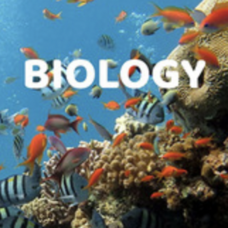Curated OER
From Polliwog to Frog
Students examine how frogs change. In this life cycle lesson, students create a model to show how a frog changes throughout its life. Students will show the process of frog metamorphosis, from polliwog to adult frog.
Curated OER
Dissolved Oxygen Lesson
Learners investigate what dissolved oxygen is and why it is important to aquatic life and what factors influence levels of dissolved oxygen in a lake. They study how to use MS Excel to make charts to show trends and correlations.
Serendip
Using Models to Understand Photosynthesis
Is your class in the dark about photosynthesis? Shed some sunlight on an important biological process with a thoughtful activity. After answering questions to help determine their level of knowledge, learners work with chemical equations...
Curated OER
Science: Microcosms in the Biosphere
In a series of lessons, examine the impact on humans by microcosms in the biosphere. Among the plans structured for learners with different abilities and learning styles, are activities describing the symbiotic relationship, drawing the...
Curated OER
Seed Structure and Seed Dispersal
Third graders plant seeds. In this seed structure lesson, 3rd graders identify parts of a seed and plant a lima bean seed. Students discuss and reflect on the process in their journals.
Curated OER
Cellular Respiration and Photosynthesis
In this cellular respiration and photosynthesis worksheet, students read through the presented material and draw an illustration of the production of ATP. Students answer several short answer questions about the production of ATP,...
America's Blood Centers
My Blood, Your Blood
Dracula isn't the only one who needs blood to survive. The eight-part unit includes seven lessons, five demonstrations, seven labs, and a project to organize a blood drive. Class members learn about the parts of blood, the form and...
National Institute of Open Schooling
Air Pollution
Seventy percent of the air pollution in China is due to car exhaust. Under the umbrella of environmental chemistry, learners extensively explore air pollution. From the makeup of our atmosphere to sources of major air pollutants, classes...
NOAA
The Dead Zone
The fifth installment of a 23-part NOAA Enrichment in Marine sciences and Oceanography (NEMO) program defines dead zones and how they form. Pupils then examine data from the Gulf of Mexico to determine dead zone formation.
Curated OER
Aerobic/Anaerobic Respiration
Both aerobic and anerobic respiration are introduced in this succinct PowerPoint. The chemical equations for both are included. The last slides give instructions for a lab activity in which pupils use a gas sensor to measure the...
Serendip
Photosynthesis and Cellular Respiration
How does energy from the sun make plants grow? Scholars move step by step through the processes that promote plant propagation during a detailed lesson. The resource illustrates ADP production and hydrolysis, then allows learners to...
Montana State University
Climb into Action!
Climate change affects even the largest and intimidating of landforms—even Mount Everest! A resource helps teach learners the connection between global climate change and its effects on Earth. Activities include videos, class discussion,...
NOAA
Climate, Corals and Change
Global warming isn't just an issue on land; deep ocean waters are also showing troubling signs. Young scientists learn more about deep water corals and the many recent discoveries researchers have made. Then they examine data related to...
Serendip
Using Models to Understand Cellular Respiration
Energize biologists with colorful images in an activity that captivates the imagination while demystifying the subject of cellular respiration. Participants build comprehension skills and access core content knowledge by analyzing text...
Space Awareness
Ocean Acidification
Learn the science behind ocean acidification and its effects on ocean wildlife. Young scientists conduct a laboratory investigation that monitors the acidity level of water. While burning a candle, learners capture the carbon dioxide in...
University of Southern California
Mastering Microbes
Small but mighty! Learners explore the role of microbes in a healthy ecosystem. An engaging lesson asks pupils to design an aquaponics system that demonstrates that healthy microbes are necessary to maintain the ecosystem.
Wilderness Classroom
Pollution
Educate scholars on pollution—air, water, and land—with a series of lessons that begin with a thorough explanation of each type. Learners then take part in three activities to reinforce the importance of reducing pollution. They...
Rainforest Alliance
Investments in Forest Carbon
One hundred metric tons of CO2 can accumulate in one acre of forest over time—that's a lot of carbon! In the activity, groups of middle school learners determine what makes forests important. They then solidify the concept by using a...
Curated OER
Yeast and Respiration
Students explore oxygen properties by conducting a cell experiment in class. In this respiration lesson, students discuss the process of breathing and how oxygen is inhaled before carbon dioxide is exhaled. Students utilize yeast, water,...
Curated OER
Model Rockets
Students build a model rocket. In this model rocket lesson, students explore a rocket launch cycle. Students investigate the laws of physics for each part of the launch. Students build model rockets and launch at school.
Curated OER
Beach Life: Spanish Banks Field Trip
Students discover beach life. In this beach life lesson, students visit a beach to find plant and animal species that live there. They discuss the life cycle and needs of some of these animals through a variety of activities.
Curated OER
The Salmon Stream and Vegetation
Students explore the ecosystem and food chain by researching Pacific Salmon. In this fish habitat lesson, students discover the life cycle for salmon, where they spawn and what they eat to survive the harsh elements. Students participate...
Curated OER
Ecosystems Beneath the Surface
Sixth graders create a KWL chart about microorganisms. In this biology lesson, 6th graders create and label a diagram on a microbial mat. They investigate the processes involved in the carbon, oxygen and sulfur cycles.
Utah Education Network (UEN)
Utah Open Textbook: Biology
Curriculum resources can be expensive—but not this one. An online textbook offers informational text for a complete high school Biology course. Topics include energy flow, body system, genetics, and evolution.




